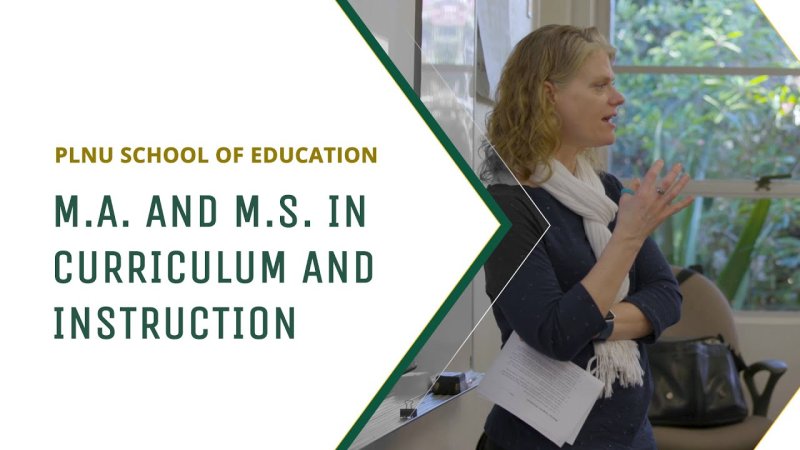
When pursuing a career in education, there are many fulfilling options you can consider. In addition to teaching at elementary, secondary, and collegiate levels, there are also opportunities in education administration, production of educational materials, and more.
One of the more popular and versatile degrees PLNU’s School of Education offers is a Master’s in Curriculum and Instruction. It is perfect for those considering becoming a curriculum expert or a teacher. Not only does holding a master’s degree result in pay raises, but it also allows you to utilize your skills to manage a classroom environment more effectively.
Here are seven different career paths you can pursue with a Master’s in Curriculum and Instruction.
*All statistics are from the Bureau of Labor unless otherwise noted.
1. Lead primary or secondary school teacher
Average annual salary: $61,320
Projected employment increase: 4% (2021–31)
Education requirements: bachelor’s degree (master’s preferred)
As an elementary or secondary school teacher, you will instruct students in one or several academic subjects. You will also interact with parents and school administrators regularly — for example, you may hold student-teacher conferences to address individual learning or behavioral concerns. You may also attend education training meetings to learn how to improve student aptitude, meet specific grade-level state learning criteria, or improve students’ standardized test performance.
Earning a master’s degree in curriculum and instruction can also help you become a more well-rounded teacher. Not only does holding a master’s degree result in higher pay, but it also allows you to utilize your skills to manage a classroom environment more effectively.
Additional credentialing opportunities are available if you have an M.A. or M.S. in Curriculum and Instruction, including a Reading and Literary Added Authorization, which allows you to teach reading comprehension in Pre-K–12 education settings.
2. Academic coach
Average annual salary: $51,000 (per Zip Recruiter)
Projected employment increase: 10% (2021-31)
Education requirements: bachelor’s degree
An academic coach or guidance counselor works directly with high school and college students to help them achieve their academic goals. Specifically, academic coaches may assist students with preparing for exams, completing college applications, and developing good study habits. They may even help their students develop resumes and apply for jobs.
3. School principal
Average annual salary: $98,420
Projected employment increase: 5% (2021–31)
Education requirements: master’s degree
You may apply the skills from a master’s in curriculum and instruction in a school leadership position, particularly as a public or private school principal. Principals oversee daily school functions. Occasionally, they may interact with students, teachers, and students when attending to disciplinary issues, as well as conferring students leadership, aptitude, and other excellence awards.
Principals will also correspond with members of the district’s school board to ensure that teachers are achieving district goals. They also assist in monitoring student academic achievement adheres to California Common Core State Standards.
______
Who are you called to be?
Pursue your purpose at PLNU.
______
4. ESL or ESOL teacher
Average annual salary: $43,800 (per Glassdoor)
Projected employment increase: 3% (2018–28 per Zippia.com)
Education requirements: bachelor’s degree
In addition to teaching at the K–12 level in the United States, your degree can prepare you for being an English Second Language (ESL) or English to Speakers of Other Languages (ESOL) teacher. ESL teachers teach beginning students in countries where English is the primary language, while ESOL teachers instruct individuals who may already speak multiple languages or have some exposure to English.
ESL and ESOL instructors have the option to become TESOL or TEFL certified. TESOL stands for “Teaching English to Students of Other Languages”, while TEFL stands for “Teaching English as a Foreign Language.”
Both certifications open up opportunities to travel and teach abroad in other countries. However, a TESOL certification allows you to teach English in your home country, whereas TEFL certification is recommended if your primary goal is to solely teach English as a second language abroad.
ESL and ESOL teachers may either teach students in-person or online. Instructors often work for agencies or companies to meet adolescent and adult language education needs.
5. Instruction coordinator
Average annual salary: $63,740
Projected employment increase: 7% (2021–31)
Education requirements: bachelor’s degree, master’s preferred.
An instruction coordinator oversees the development of educational curricula. Your job duties may include reviewing your school curriculum for quality, consistency, and adherence to state guidelines.
In this role, you’ll use your educational and administrative skills to collaborate and evaluate people in different educational roles, such as educators and school principals. In addition, you may monitor whether benchmarks are being met, as well as provide teacher feedback at staff meetings.
A certificate in teacher induction and supervision support is an in-demand qualification that can help you set yourself apart as an expert mentor for educators.
6. Museum education coordinator
Average annual salary: $40,399 (per Zippia)
Projected employment increase: 9% (2018–28)
Education requirements: bachelor’s degree; art history or education background preferred
If you’re considering careers outside of a classroom setting, a master’s in curriculum and instruction can help you transition into a variety of industry positions. Museums often hire educational coordinators and researchers. Museum education coordinators work in tandem with multiple departments and the museum’s collection to develop an accurate, consistent curriculum that is used as a guide to create informative exhibits for guests. Coordinators can focus on subjects like STEM, art, and history to inform these programs. Such offerings may include guided student tours, gallery talks, and other events.
In addition to overseeing a team of museum educators and volunteers, education coordinators also establish partnerships with donors and administer program evaluations. They also stay informed about new developments in their field to ensure the museum’s curriculum is up to date.
7. Textbook writer
Average annual salary: $46,870
Projected employment increase: 4% (2021–23)
Education requirements: bachelor’s degree; education background or technical writing experience preferred
If you are considering education careers outside of the classroom, another option is a textbook writer. You’ll be involved in the writing and editing processes while ensuring the curriculum is accurate, timely, and adheres to state and national standards. Having a background in instructional design or technical writing is a huge benefit when working with textbook publishers.
You will often collaborate with other departments in textbook creation. In addition, you may be required to have experience using programs like Microsoft Office, Adobe Suite, or in-house publishing software.
Take the next step
There are many education pathways you can take when considering a Master in Curriculum and Instruction degree. You can work directly with students as a teacher or school administrator, coordinate education efforts at museums or apply your skills abroad in other countries.
